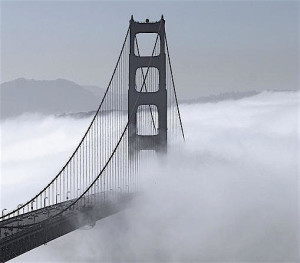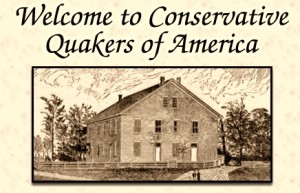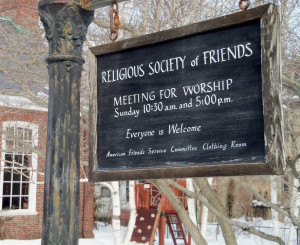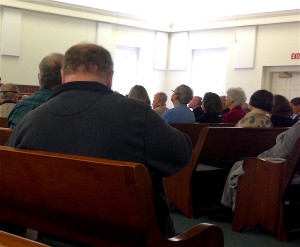Quaker Exorcisms II: No Magic Wands
Quaker Exorcisms I is here.
One: Taking One (Or Two) For The (Quaker) Team
Usually it was great going to Meeting in San Francisco in 1976.
The meetinghouse was then on Lake Street, directly overlooking the bay. Through a big window, we sat and followed sinuous gray bands of fog streaming up from the ocean and making the Golden Gate Bridge towers vanish and reappear like some gigantic friendly ghosts waving vast outspread cable arms.

I don’t know if this vista would have been mystical enough for Rufus Jones, or sufficiently Christian for Everett Cattell; but for me it was like the world’s biggest lava lamp, and just as hypnotic — er, meditative.
Usually.
On this spring First Day morning, it looked as good as ever. The sun was out, the fog was in retreat. I arrived early, found my favorite spot, and settled in to watch the bridge gleaming in the crystal air.
Others trickled in. A newcomer sat right in front of me, partially blocking my view. But he was young, trim, and didn’t fill up too much visual space; I could still take in enough of the scene.
When meeting began, the room was mostly full, and there were the usual rustlings, quiet sighs, and occasional cough. Someone rose early to thank God for the beautiful day. (Normally, weather reports as Spiritual messages sound banal to me, but this time I couldn’t argue, even silently.) Soon the handful of children stirred and trooped off downstairs.
After settling again, someone spoke about the coming presidential campaign, and the issues of war and peace that hung on it. (I couldn’t decide if this had been recycled from FCNL or NPR, then shrugged it off.)
But mentioning the election was a signal; not to me, but to the young fellow in front of me. He stood up, looked around, flashing a shy, appealing smile.
“Yesterday,” he began, “the national Democratic Party platform committee held a public hearing, here in San Francisco. I had some important testimony I wanted to share with them. But I didn’t get a chance to.”
He glanced out the window, then gave us another fetching smile.
“So I’d like to share it with you.”
 He reached for a shirt pocket. I heard papers unfolding.
He reached for a shirt pocket. I heard papers unfolding.
“It’s not long,” he soothed, then cleared his throat. “It’s only — seven pages.”
He started to read. Something about freedom and peace, I think. But I wasn’t following the words. I was stretching my back, straining to see over his shoulder at the sheets of paper in his hand.
Finally I saw them: OMG, they were typed, single-spaced: solid blocks of text that would stretch from here, one could think, all the way across the wide bay to Sausalito, or even Mill Valley.
I sagged back in my folding chair. It creaked. The bridge was forgotten. Seven pages of what were already less than coherent ramblings? What could be done? Help!
Help did arrive, but not until midway through page two, when I had completely lost the thread, if there was one.
I didn’t know the older woman who stood, but she qualified as what some would call a “seasoned Friend.” That is, one with gumption enough to interrupt.
She was gentle about it, I thought; but also spoke clearly, and loud enough to break his flow.
“Excuse me, Friend,” she said, “but this is a Quaker meeting for worship, and your interesting statement is not really suitable for this setting. If you like, I’d be willing to talk with you afterwards, and hear more about it.”
He stared at her for a moment. Then he nodded. I heard the papers folding, and he sat down.
There was a long moment of tense silence. Just as my gaze was moving back toward the big window, he stood up abruptly and walked out of the room. We heard the front door wheeze shut behind him, and his shoes click down the front steps.
So much for the beautiful day. And it didn’t end when the elders shook hands to close the meeting. The ritual of announcements had hardly begun when a younger woman, a regular attender, interrupted to denounce “us,” and especially the “seasoned Friend,” for the terrible “violence” she said we had just done to this defenseless visitor.
Terrible violence? That’s not what it looked like to me. But of course the agonizing and second-guessing was off and running. I stayed for awhile, and tried to stand up for the beleaguered “seasoned Friend,” but it was still going when I left. In those days I didn’t get to business meeting much, so I don’t know if the dispute migrated there.
What I had seen was a woman Friend who had the gumption to stand and “take one for the team” by defending the meeting; but on whom the tables had turned and was now about to take one from the team. I hope she was “seasoned” enough to have reckoned on that possibility too. (Does this qualify as, “No good deed goes unpunished”?)
Two: The Stranger and The Disappearing Fireplace
Three thousand or so miles east, in Friends Meeting at Cambridge, Massachusetts, they had a working fireplace during my first couple of winters there. This was the end of the 1960s, and I was on the cusp of turning thirty; still a “young adult Friend.”
The fireplace was front and center in the large meeting room, and was mesmerizing to watch, as the logs glowed and flickered, their crackling louder in the silence yet without seeming to disturb it.
 So it was both a marvel and a disappointment, when one warm spring was come upon us, that a member of House and Grounds made an announcement after worship.
So it was both a marvel and a disappointment, when one warm spring was come upon us, that a member of House and Grounds made an announcement after worship.
He explained that the Meeting was founded, not even fifty years ago, by a mixed bag of Quakers, among whom there were a few of rather strong Wilburite sentiments.
The Wilburites, also called Conservative Friends, were they who clung longest and most tenaciously to the old ways of Friends: the “thee” and “thou” plain language, which I still heard there from time to time; and the plain dress, though that was gone from among us.
And, the House & Grounds Friend added, they were likewise very suspicious of open fireplaces.
Not that they opposed heat, mind you: the Inner Light, unaccompanied, would not get even the most devout of them through a New England winter. But for meetinghouse heat, they favored wood stoves, with iron doors that closed.
Why? Because fire was an ancient religious symbol, in many pagan faiths. Ancient, yet very much alive. The leaping flames, the flying sparks, the waves of heat, all were shimmering idols.
And there they were, dancing and tempting us through the many First Days of those long cold months, drawing our attention away from the creator to this makeshift altar, which was really no more than another creature.
 He spoke the truth about the fire; I could have sat there all day watching it.
He spoke the truth about the fire; I could have sat there all day watching it.
To accommodate this concern, he said, a special piece of wainscoting had been constructed, which fit exactly into the fireplace opening, for the warmer months, to free us of reminders of it.
To demonstrate, he pulled the piece from behind a bench, then slid it home, and stepped back, to general ohs and ahs:
Presto! The fireplace was gone.
But having made the point, that year the Wilburite sentiment seemed to ebb, and when the following summer arrived, the wainscoting did not follow. Instead, the ashes were all scooped out, and in their place were set half a dozen very non-sacred looking potted plants. (I wondered whether this change suggested there had been some discreet struggle and mediation within the House & Grounds Committee about this, but if so, such knowledge never leaked out.)
So now one could watch the leaves flutter fitfully, and at least remember the winter’s glow. But this tableau was hardly visually exciting; which was doubtless in part the intention.
It wasn’t exciting, that is, until the morning The Stranger came to us.
He arrived late that First Day; the meeting room and balcony were nearly full, and we were settling in pretty well. So we all heard him open the big door at the back, and then the squeak of his rubber-soled shoes on the floor.

He strode right down the center aisle, between the long full benches, as if confident a space had been reserved especially for him.
And so it was: it appeared at the end of the bench just to the right of the fireplace.
He sat down, crossed his legs, and leaned forward. He seemed to be peering into the fireplace with intense concentration. As if there were something revelatory about the bushy ficus, the struggling peace lily, or the scorched bricks.
And there must have been, because after a few moments he stood up.
He was tall, slender, wearing a well-used brown suit. Standing right by the fireplace, he might as well have been at a pulpit.
His dark eyes seemed to burn. After surveying us for a moment, as if to be sure all were listening, he spoke, clearly and firmly:
“You cannot give, what you have not got.”
He let this seem to echo, then abruptly sat down. Legs crossed again, leaning, gaze fixed on the plants.
I looked to my left, then to the right. The signs were obvious to the regular attender: a knitted brow here, a slight shifting on the bench there, a hand moved to the breastbone: passive aggressives now on guard. The air of faint dismay telegraphed the message: the hope that this would be all; and the fear that it was not.
The fear was right. In about five minutes, the Stranger was up, again, shot from his seat as if pushed by hands we couldn’t see:
The same visual buildup, and this time the tone was more ominous, his voice louder:
“There will be women rulers.”
 And then down, back to the plants. I glanced around again. Beads of sweat were now gathering on a couple of foreheads. The tension was palpable.
And then down, back to the plants. I glanced around again. Beads of sweat were now gathering on a couple of foreheads. The tension was palpable.
As was the uncertainty: speaking twice in meeting was [an unwritten] taboo. And yet — both times, he had emitted only a single short sentence. Each was coherent, if lacking context. But they were also full of tension, like a tightening spring. On the other hand, they weren’t abusive of any person or group.
“Women rulers” — was that even political?
Maybe that was the end.
But what if it wasn’t?
The moments passed. In my memory is the noise of a loud, slow-ticking clock; but there was no clock in the meeting room. Maybe it was the pounding of my blood pressure.
Finally I heard a long exhaled breath, as someone edged back toward the brink of relaxing.
And then he was up again.
The words this time I can’t remember; but it came with cumulative pressure, like a projectile ricocheting off the walls. Yet it was no more than another single, clipped sentence, that jumped from under those intense dark eyes, and after looking us over once more, he was back eyeing the dark gray slates of the fireplace floor.
Now I could feel something like panic beginning to rise. I wanted to jump up and run out the door, but was afraid to be the first one.
Wouldn’t someone, some elder, tell him to shut up? Ask to take him for a walk, or offer a private listening ear?
Who? What was this, a church or a psychiatric clinic?
But wait — his statements weren’t “crazy.” Each one “made sense.”
Around me I felt I could almost hear others repeating much the same inner dialogue –or was it a shouting match? — on all sides.
No more, please Lord. No more.
But there was more. After similar pauses, he rose two additional times; spoke one more sentence each, coherent but disconnected and unnerving, which I’ve also blocked out, like a trauma survivor. (I wonder if anyone else who was there that morning could recall all five.)
After the fifth sentence, I was counting off seconds before doing something “out of order,” though I didn’t know what.
It was Louisa Alger who rescued us.
I wonder if Louisa, a retired schoolteacher, was one of the Wilburite Conservatives with qualms about our winter fire-worship. She was certainly all New England, absolutely no nonsense, as practical as gold-rimmed bifocals.
Still, I believe she went through some of the same soundless agonizing as did I and so many others in that crowded room.
But when the Stranger sat down after his fifth stentorian sentence, she hesitated no more.
Seated not far from him a row or two back, and visible to most, she half-rose, turned to her left, and very noticeably seized the hand of the Friend next to her. She pumped it high and obviously, thereby breaking meeting.
Even without a clock, I knew we had only been gathered about thirty minutes at most, not quite half the usual allotted time. This despite fact that it had felt as if hours had passed between each of the Stranger’s fevered outbursts.
Louisa’s handshake was a deft move: closing the meeting was definitely a drastic step; but it did not actually break decorum, or isolate and humiliate the Stranger. And it put the rest of us out of our misery: how many could have borne another five or six of his epigrammatic oracles?
Her handshake was also like a pin in an almost soundless balloon: the pressure burst out of us, and then everyone was murmuring some half-garbled greeting, chuckling at a brainless pleasantry, the air instantly thick with our giddy relief.
As I caught my breath, I glanced over and saw Louisa and a male elder closing in on the Stranger. I half-wanted to listen in on the conversation. Louisa, I knew, was not one for feelgood small talk. “Was there some medicine thee failed to take, Friend?” Was more likely an inquiry than some pap about his messages; or “Is there someone we could call to come pick thee up?”
But I didn’t try. Because even more than that, I wanted to get outside, to breathe in some fresh air, and think about something else.
And I didn’t care about giving what I had not got, or even if there were women rulers.


Thank you for reminding me of Louisa.
She’s unforgettable.
Very interesting stories–and very well told!
Are these stories in a book?